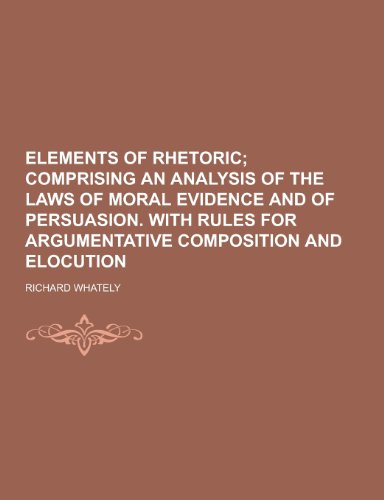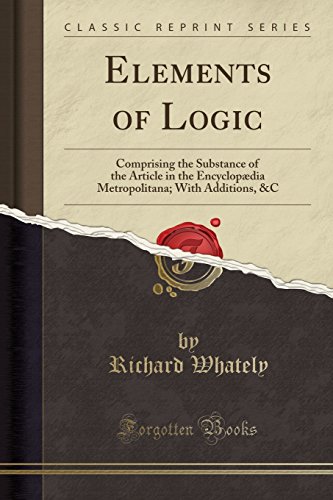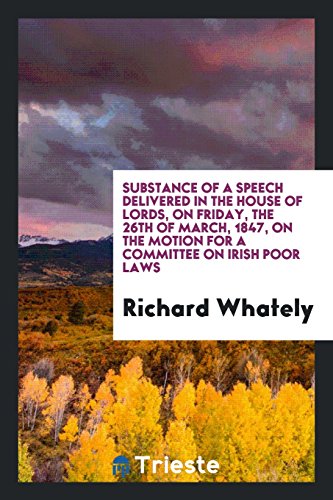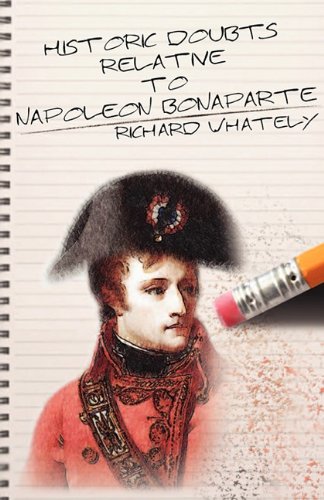Background
He was born on 1 February, 1787 in London, the son of the Rev. Dr. Joseph Whately (1730–1797). Whately’s father, Joseph Whately, was a minister and a lecturer at Gresham College.


(First published in 1928 and revised and expanded for over...)
First published in 1928 and revised and expanded for over 30 years, this practical application of logic and rhetoric serves as the theoretical centerpiece for every contemporary textbook on argumentation.
http://www.amazon.com/gp/product/1932716505/?tag=2022091-20

(Elements of Logic Comprising the Substance of the Article...)
Elements of Logic Comprising the Substance of the Article in the Encyclopaedia Metropolitana With Additions C Classic Reprint
http://www.amazon.com/gp/product/1330125908/?tag=2022091-20

( Direct, comprehensive, well organized, simple in statem...)
Direct, comprehensive, well organized, simple in statement, Elements of Rhetoric is in all respects well fitted to fulfill its assigned role as a textbook. The remarks on practical problems and the examples and analogies confirm contemporary reports that Whately was himself a talented and stimulating teacher. The modern field of speech was born near the beginning of the twentieth century, some seventy years after Whately wrote. But influential leaders in the new field endorsed Whatelys judgments, and courses and textbooks in public address have remained strongly influenced by his ideas. Whatelys views on a number of major questions in rhetoric have proved sound and fruitful during many decades of practice, and his book remains one of the most influential works on the subject.
http://www.amazon.com/gp/product/0809329743/?tag=2022091-20

(Trieste Publishing has a massive catalogue of classic boo...)
Trieste Publishing has a massive catalogue of classic book titles. Our aim is to provide readers with the highest quality reproductions of fiction and non-fiction literature that has stood the test of time. The many thousands of books in our collection have been sourced from libraries and private collections around the world.The titles that Trieste Publishing has chosen to be part of the collection have been scanned to simulate the original. Our readers see the books the same way that their first readers did decades or a hundred or more years ago. Books from that period are often spoiled by imperfections that did not exist in the original. Imperfections could be in the form of blurred text, photographs, or missing pages. It is highly unlikely that this would occur with one of our books. Our extensive quality control ensures that the readers of Trieste Publishing's books will be delighted with their purchase. Our staff has thoroughly reviewed every page of all the books in the collection, repairing, or if necessary, rejecting titles that are not of the highest quality. This process ensures that the reader of one of Trieste Publishing's titles receives a volume that faithfully reproduces the original, and to the maximum degree possible, gives them the experience of owning the original work.We pride ourselves on not only creating a pathway to an extensive reservoir of books of the finest quality, but also providing value to every one of our readers. Generally, Trieste books are purchased singly - on demand, however they may also be purchased in bulk. Readers interested in bulk purchases are invited to contact us directly to enquire about our tailored bulk rates.
http://www.amazon.com/gp/product/0649198220/?tag=2022091-20

(The atheist philosopher David Hume unleashed an assault o...)
The atheist philosopher David Hume unleashed an assault on Christianity in the 1700s that reverberates to this day. By undermining arguments based on or included references to miracles- or documents that contained them- many a person embraced his strict empiricism. Famously rising to the challenge, the Rev. Richard Whately showed that employing the same kind of 'empirical' scrutiny to other historical claims would result in absurdities. Namely, we could know little, if anything, about the famous Napoleon Bonaparte (Buonaparte). Indeed, one might even conclude he hadn't existed at all! There was only one problem: Napoleon had carried out his great feats within the lifetime of Whately's readers and his existence, and those feats, were common knowledge! Something had to give, either Hume's strict empiricism or knowledge itself (ie, epistemology). Whately is convinced that his playful analysis of Hume's reasoning would have been seen by Hume himself to show the great joke his reasoning was. Unfortunately, Hume died in 1776, and it is up to modern readers to decide for themselves if Whately was correct.
http://www.amazon.com/gp/product/1936830019/?tag=2022091-20

(This historic book may have numerous typos and missing te...)
This historic book may have numerous typos and missing text. Purchasers can usually download a free scanned copy of the original book (without typos) from the publisher. Not indexed. Not illustrated. 1874 edition. Excerpt: ... who being ii. all cases, less able to look beneath the earface of tlings, obtains at the first glance the best view he can take of any subject; and therefore can display without any need of artifice, that easy unembarrassed confidence which can never be with equal effect, ttssumed. To speak perfectly well, in short, a man must feel that he has got to the bottom of the subject; and to feel this, on occasions where, from the nature of the case, it is impossible he really can have done so, is inconsistent with the character of great profundity. PART I OF THE INVENTION, ARRANGEMENT, AND INTRODUCTION OF PROPOSITIONS AND ARGUMENTS Chap. I.--Of Propositions. § 1. It was remarked in the Treatise on inquiry a Logic, that in the process of Investigation pro-ter Truth perly so called, viz. that by which we endea-JjijJJjJrt, vour to discover truth, it must of course be un-distinguish certain to him who is entering on that process, edwhat the conclusion will be to which his researches will lead; but that in the process of conveying truth to others by reasoning, (. e. in what may be termed, according to the view 1 have at present taken, the rhetorical process,) the conclusion or conclusions which are to be established must be present to the mind of him who is conducting the Argument, and whose business is to find Proofs of a given proposition. It is evident, therefore, that the first step to be taken i-y him, is to lay down distinctly in his own mind the jrciposition or propositions to be proved. I? might in deed at first sight appear superfluous even to mentioi so obvious a rule; but experience shows that it is 05 no means uncommon for a young or ill-instructed writer to content himself with such a vague and indisUnd view of the point he...
http://www.amazon.com/gp/product/1230201068/?tag=2022091-20
economist logician rhetorician theologian
He was born on 1 February, 1787 in London, the son of the Rev. Dr. Joseph Whately (1730–1797). Whately’s father, Joseph Whately, was a minister and a lecturer at Gresham College.
He was educated at a private school near Bristol, and at Oriel College, Oxford from 1805.
The lectures, On the Use and Abuse of Party Spirit in Matters of Religion, were published in the same year.
He was appointed Drummond professor of political economy in 1829 but resigned in 1831 in order to accept an appointment as archbishop of Dublin, after which he was primarily involved in local politics.
His importance is due, instead, to his having been the first English logician to correct a mistaken conception of the nature and function of logic that had dominated English thought since the time of Locke and had led to the sterility of that discipline in England for over 150 years.
In place of the traditional formal analysis Duncan substituted a description of Locke’s views on psychology and epistemology; Watts, who had little interest in theoretical issues, discussed the ways in which men abuse their intellectual faculties and offered practical advice.
Watts and Duncan, following Locke, rejected the traditional formal analysis of reasoning apparently because they felt that it was not helpful in guiding man in the proper use of his intellectual faculties.
Since they believed that this sort of practical guidance was the proper role of logic, they concluded that logic must be radically reformed by deemphasizing the traditional formal analysis and by replacing it with the material found in their books.
Maintaining that this mistaken conception of logic had been responsible for its decline, Whately devoted most of The Elements of Logic to refuting objections to the traditional formal analysis.
According to Whately, logic is concerned with an analysis of the forms of all valid reasoning, that is, with providing forms to which all valid arguments can be reduced.
If a formal analysis provides these forms, then it has succeeded in fulfilling the proper role of logic.
Taking their point of departure from Francis Bacon, they argued that deductive reasoning, of the type formally analyzed by the traditional logicians, was of little importance in the acquisition of knowledge, which increases only by observations and experimentation.
This point was reinforced by Dugald Stewart’s acute observation, long before John Stuart Mill, that deductive arguments are in some sense circular and cannot yield new knowledge because the premises of a valid deductive argument presuppose the truth of its conclusion.
He claimed, however, that it is nevertheless true that deductive reasoning plays an important role in our cognitive activities.
Its purpose is no enable us to discover previously unnoticed consequences of propositions the truth of which we have already established.
Since deductive reasoning does play this important role, a formal analysis of the conditions for its validity obviously is of great significance. For Whately, the much more serious objection to the traditional formal analysis was that it did not present a formal analysis of the conditions for the legitimacy of inductive reasoning.
His response to this was twofold.
He began by claiming that any inductive inference is really a deductive one: its first premise is a summary of the evidence that certain objects of a given type have a given property, and the second premise is a claim of the from “The property had by the examined individuals is had by all members of that type. ”
Therefore, the conditions for the legitimacy of inductive inferences are given by any adequate account of the conditions for the validity of deductive inferences.
The reevaluation of formal deductive logic stimulated by Whately’s works resulted in tremendous progress in deductive logic in England during the nineteenth century, culminating in the formulation of the algebra of logic.
He was a leading Broad Churchman, a prolific and combative author over a wide range of topics, a flamboyant character, and one of the first reviewers to recognise the talents of Jane Austen.
He contributed two famous articles to the Encyclopedia Metropolitana, one on logic and the other on rhetoric.
Both were reprinted as books: The Elements of Logic (1826) and The Elements of Rhetoric(1828).
Later, in 1846, he founded the Dublin Statistical Society with William Neilson Hancock.
(First published in 1928 and revised and expanded for over...)
( Direct, comprehensive, well organized, simple in statem...)
(Elements of Logic Comprising the Substance of the Article...)
(The atheist philosopher David Hume unleashed an assault o...)
(This Elibron Classics edition is a facsimile reprint of a...)
(Trieste Publishing has a massive catalogue of classic boo...)
(This historic book may have numerous typos and missing te...)
He was a follower of Edward Copleston, regarded as the founder of the Noetics taken as apologists for the orthodoxy of the Church of England.
A devout Christian, Whately took a practical view of Christianity.
He disagreed with the Evangelical party and generally favoured a more intellectual approach to religion.
He also disagreed with the later Tractarian emphasis on ritual and church authority.
Instead, he emphasised careful reading and understanding of the Bible.
He saw no inconsistency between science and Christian belief, differing in that way from some Christian critics of Malthus.
He differed also from Jones and Whewell, expressing the view that the inductive method was of less use for political economy than the deductive method, properly applied.
Most of his writings, however, are quite sound and—more important from the historical point of view— seemed quite valid to his contemporaries.
He felt, however, that there could be no formal analysis of these conditions and that the question of the legitimacy of such an inference would have to be decided on independent grounds in each case.
Not all of Whately’s responses to the eighteenth-century critiques of logic as a formal analysis of deductive reasoning are valid, and his final remarks about induction are particularly dubious.
Whately supported religious liberty, civil rights, and freedom of speech for dissenters, Roman Catholics, Jews, and even atheists.
On 27 March 1848, Whately became a member of the Canterbury Association.
He was elected a Foreign Honorary Member of the American Academy of Arts and Sciences in 1855.
He was a member of the Dublin Statistical Society.
He was a great talker, a wit, and loved punning. In Oxford his white hat, rough white coat, and huge white dog earned for him the sobriquet of the White Bear, and he exhibited the exploits of his climbing dog in Christ Church Meadow.
Whately married Elizabeth Pope (third daughter of William Pope, born 7 October and baptised 22 December 1795 at Hillingdon, Middlesex) at Cheltenham on 3 July 1821. She later authored some Christian literature herself, dying 25 April 1860. Her younger sister Charlotte married Baden Powell in 1837.
a medical missionary in Egypt
a religious author
a cleric
